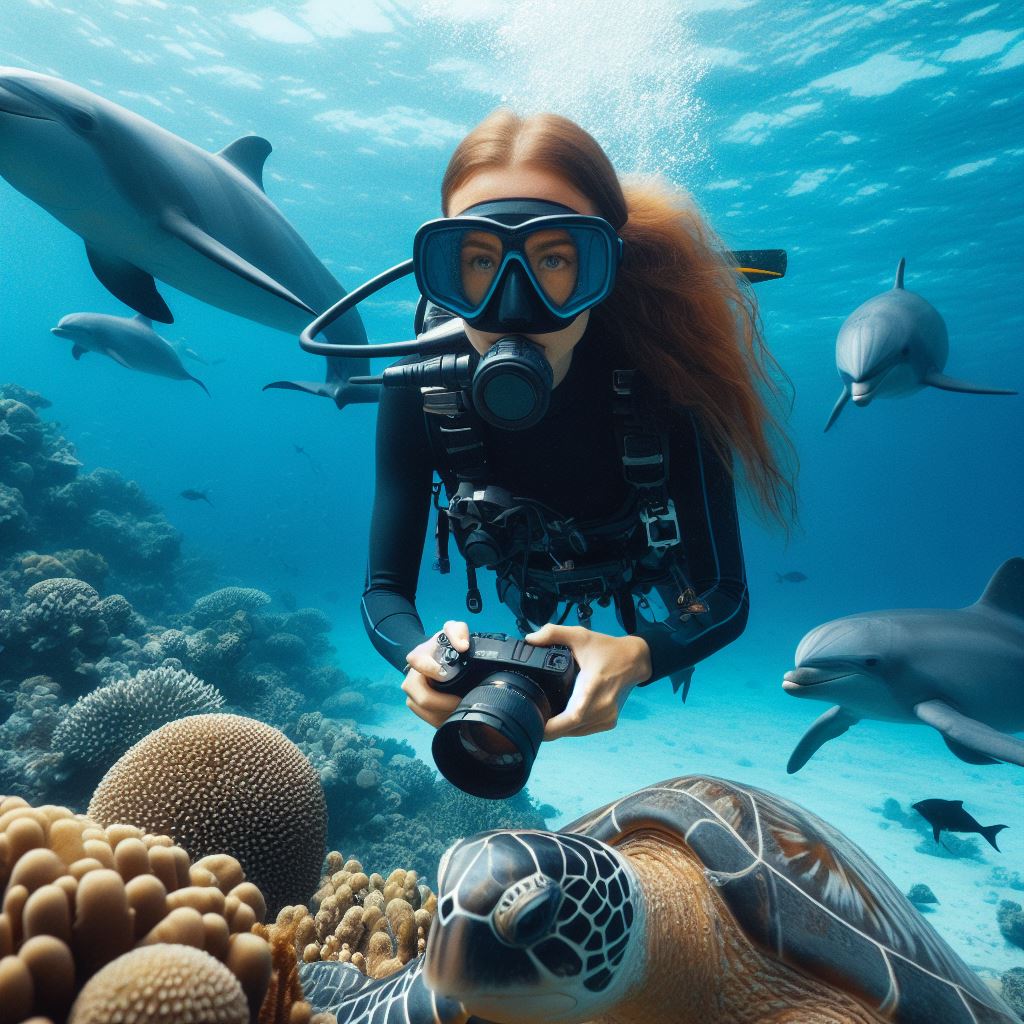Introduction
Marine biology is an essential field that plays a crucial role in comprehending and safeguarding marine ecosystems.
As we delve into a day in the life of a UK marine biologist, we will explore the wide array of tasks and duties they encounter.
As marine biologists, our main objective is to unravel the mysteries of the ocean and its inhabitants, enabling us to protect these fragile ecosystems effectively.
Through our research, we gain valuable insights into the functioning of marine habitats and the impact of human activities.
A typical day for a marine biologist is far from monotonous; it involves a diverse range of responsibilities.
Fieldwork often consumes our mornings, where we conduct underwater surveys, collect samples, and observe marine life.
Whether diving deep into coral reefs or exploring rocky shores, we document the abundance and diversity of species.
Back in the lab, we spend hours meticulously analyzing the collected data, focusing on patterns and relationships.
This information aids in understanding population dynamics, species interactions, and the overall health of marine ecosystems.
Additionally, we collaborate with other scientists and policymakers to provide recommendations for sustainable management and conservation efforts.
Communication also plays a significant role in our daily routine, as we share our findings through scientific publications and public presentations.
By raising awareness about the challenges faced by marine environments, we aim to encourage collective action and promote environmental stewardship.
Generally, marine biology offers an exciting and rewarding career path, allowing us to contribute to the preservation of our oceans.
Through our daily endeavors, we strive to deepen our knowledge and inspire others to take an active role in protecting our marine ecosystems.
Education and Qualifications
- To become a marine biologist in the UK, a strong educational background is required.
- Relevant degrees in the field of marine biology or related fields are highly recommended.
Some of the degree programs that aspiring marine biologists can consider include:
- These degree programs provide a solid foundation in subjects such as biology, marine ecology, and oceanography.
- Additionally, postgraduate degrees such as Master of Science (MSc) or Doctor of Philosophy (PhD) in Marine Biology can further enhance career prospects.
- Completing internships or research projects during undergraduate or postgraduate studies can also be beneficial.
- Obtaining hands-on experience through fieldwork and research can provide practical skills and knowledge.
- In terms of additional qualifications or certifications, it is important to gain First Aid and CPR certification.
- Other certifications that may be valuable include diving certifications such as PADI Open Water Diver or Advanced Open Water Diver.
- These certifications ensure that marine biologists can safely conduct underwater research and have the necessary skills for emergencies.
- Moreover, staying updated with the latest research and advancements in the field by attending conferences and workshops is vital.
- Continued professional development through memberships in relevant organizations like the Society for Marine Biology or the British Ecological Society is highly recommended.
- These memberships provide access to resources, networking opportunities, and the chance to collaborate with other marine biologists.
- Overall, a strong educational background combined with relevant degrees, practical experience, and additional qualifications sets the foundation for a successful career as a marine biologist in the UK.
Read: Top Tools Every UK Data Analyst Should Know
Research and Fieldwork
Research and fieldwork play a crucial role in the daily life of a UK marine biologist.
Through these activities, marine biologists gather valuable data and information about the marine environment, which helps in understanding and conserving the diverse marine life.
Role of Research
- Research is the foundation of a marine biologist’s work, as it drives scientific discovery and helps answer important questions about marine ecosystems.
- Marine biologists conduct research to study the behavior, distribution, and abundance of various marine species.
- They investigate the impacts of environmental factors such as pollution, climate change, and habitat loss on marine organisms.
- Research also involves studying the interactions between different species and their role in maintaining the balance of marine ecosystems.
- The findings of research are used to develop effective conservation strategies and policies for the protection of marine environments.
Techniques and Tools for Collecting Data
- Underwater research equipment is essential for collecting data in marine environments.
Tools such as underwater cameras, ROVs (remotely operated vehicles), and hydrophones are commonly used. - ROVs enable marine biologists to explore deep-sea habitats and record high-quality images and videos of marine organisms.
- Acoustic equipment like hydrophones helps in studying marine mammals by recording their vocalizations.
- Sampling techniques involve using nets, traps, and dredges to collect specimens of marine organisms for further analysis.
- Advanced technologies like DNA sequencing and satellite tracking are also employed to gather data on migratory patterns, genetic diversity, and population dynamics.
The Importance of Fieldwork
- Fieldwork allows marine biologists to directly observe and study marine organisms in their natural habitats.
- Surveys conducted during fieldwork provide valuable information about the population size, distribution, and health status of marine species.
- Through fieldwork, biologists can identify and document new species, contributing to the overall knowledge of marine biodiversity.
- Fieldwork also includes underwater exploration and diving, enabling biologists to study the physical characteristics of marine habitats.
- Monitoring marine life is an essential component of fieldwork, as it helps track changes over time and assess the effectiveness of conservation efforts.
In essence, research and fieldwork are integral to the work of a UK marine biologist.
By utilizing various techniques and tools, they collect data, analyze it, and gain insights into the complex marine ecosystems.
This knowledge is vital for the conservation and sustainable management of the marine environment.
Read: Career Progression for Data Analysts in the UK
Laboratory Work and Analysis
The significance of laboratory work in marine biology research cannot be overstated
When it comes to studying marine biology, laboratory work and analysis are integral parts of the research process.
While fieldwork allows marine biologists to observe and interact with marine organisms in their natural habitats, laboratory work provides an opportunity to delve deeper into the collected samples and data, allowing for detailed analysis and identification of various species.
Analyzing samples, identifying species, and studying collected data are some of the crucial tasks involved
One of the key tasks in laboratory work is analyzing samples obtained during field surveys.
These samples may include water, sediment, plankton, or tissue specimens from marine organisms.
By carefully examining these samples, marine biologists can gain insights into the health and abundance of different species, as well as the overall ecosystem dynamics.
Identifying species is another essential aspect of laboratory work.
By utilizing various taxonomic keys, microscope slides, and genetic techniques, marine biologists can categorize and name the organisms they encounter in their research.
This information is crucial for understanding biodiversity patterns, population dynamics, and ecological interactions within marine environments.
Studying collected data is yet another significant task in the laboratory.
Marine biologists meticulously record and analyze various parameters such as water chemistry, nutrient levels, temperature, and species abundance.
This data is then used to draw scientific conclusions, generate hypotheses, and develop conservation strategies to protect fragile marine ecosystems.
Personalized UK Career Consulting
Receive tailored career guidance designed just for you. Get actionable steps and expert support to boost your career in 1-3 days. Take control of your career now.
Get StartedAdvanced technologies and equipment play a vital role in the data analysis process
In recent years, the field of marine biology has witnessed a significant surge in the use of advanced technologies for data analysis.
Cutting-edge equipment, such as DNA sequencers and spectrometers, allows for precise identification of species, detection of subtle genetic variations, and analysis of chemical composition in samples.
These technologies aid in providing a more accurate understanding of marine ecosystems and their response to environmental changes.
The application of geographic information systems (GIS) is also gaining prominence in marine biology research.
GIS allows for the creation of detailed maps that integrate various data layers, such as species distributions, habitat types, and human activities.
This spatial analysis helps in identifying important areas for conservation and effective management of marine resources.
In fact, laboratory work in marine biology research holds immense significance.
It enables marine biologists to analyze samples, identify species, and study collected data, contributing to a comprehensive understanding of marine ecosystems.
The use of advanced technologies and equipment further enhances the accuracy and depth of data analysis, driving advancements in this fascinating field.
Read: Networking for Data Analysts: UK Events 2024

Collaboration and Networking
Marine biology work revolves around collaboration and networking, as scientists understand the value of joining forces and sharing knowledge.
By working together, marine biologists can make significant advancements in their research and contribute to the conservation and understanding of marine ecosystems.
The Collaborative Nature of Marine Biology Work
- Marine biology is a highly collaborative field, with scientists actively seeking opportunities to work together.
- Researchers from different backgrounds and institutions collaborate to bring diverse perspectives to their studies.
- This collaboration fosters innovation and allows for a more comprehensive understanding of the marine environment.
- Marine biologists often partner with various professionals, including oceanographers, chemists, and geneticists.
- By leveraging each other’s expertise, scientists can tackle complex research questions and gain a holistic understanding of marine life.
The Importance of Networking
- Networking is crucial for marine biologists, as it enables them to establish connections with fellow researchers, institutions, and organizations.
- Through these networks, scientists can access new research opportunities, funding sources, and data-sharing platforms.
- Networking also facilitates the exchange of ideas and promotes collaboration on multidisciplinary projects.
- Attending conferences, workshops, and seminars allows marine biologists to expand their professional network.
- These connections provide access to cutting-edge research and foster collaborations that can lead to groundbreaking discoveries.
Benefits of Collaborating on Research Projects
- Collaborating on research projects allows marine biologists to pool their resources, making experiments and data collection more efficient.
- Collaboration also enables researchers to share equipment and technology, reducing costs and expanding research capabilities.
- Pooling knowledge and expertise enhances the quality of research outcomes and increases the chances of making significant scientific breakthroughs.
- Different perspectives brought by collaboration stimulate innovation and provide a more comprehensive understanding of marine ecosystems.
- Collaboration also fosters professional growth and opens doors for future research opportunities and funding.
In short, collaboration and networking are integral to the field of marine biology.
By working together and building networks, scientists can push the boundaries of knowledge, tackle complex research questions, and contribute to the conservation of marine ecosystems.
The collaborative nature of this field highlights the importance of teamwork and the power of collective efforts in advancing scientific understanding.
Read: Freelance Data Analysis: A UK Market Guide
Conservation and Environmental Impact
Marine biologists play a crucial role in conservation efforts and minimizing environmental impact.
They are at the forefront of protecting marine ecosystems and ensuring their sustainability.
One of the main responsibilities of marine biologists is to develop and implement conservation plans and policies.
They conduct research and gather data to assess the health of marine ecosystems and identify potential threats.
Through their expertise, marine biologists can recommend management strategies and conservation actions to mitigate the negative impacts on marine environments.
They work closely with government agencies, non-profit organizations, and other stakeholders to ensure these plans are put into action.
Raising awareness and educating the public about marine ecosystems and their conservation is another essential aspect of a marine biologist’s work.
They strive to inspire a sense of responsibility and stewardship among individuals and communities.
By organizing public outreach programs, marine biologists aim to engage people of all ages in activities that promote environmental awareness.
They conduct workshops, give presentations, and participate in community events to educate the public about the importance of marine conservation.
Marine biologists also play a vital role in educating policymakers and influencing decision-making processes.
They provide scientific knowledge and expertise to guide the development of sustainable management practices and policies.
Marine Biologists: Guardians of Ocean Conservation
Through their research and advocacy, marine biologists contribute to the conservation of endangered species, protection of sensitive habitats, and prevention of pollution in marine ecosystems.
Your Dream Job Starts with a Perfect CV
Get a tailored CV and cover letter that captures your unique strengths and stands out in your industry. Let us help you make an unforgettable first impression.
Get StartedFurthermore, marine biologists actively collaborate with other scientists and experts in interdisciplinary fields to address complex conservation challenges.
They work together to find innovative solutions that balance human activities and the preservation of marine biodiversity.
In addition to their efforts on the field, marine biologists also contribute to scientific literature and knowledge exchange.
They publish research findings, participate in conferences, and engage in peer-reviewed discussions to stay updated on the latest developments in marine conservation.
The work of marine biologists is essential for the long-term sustainability and well-being of our oceans.
By actively engaging in conservation efforts and minimizing environmental impact, they protect fragile marine ecosystems for future generations.
Therefore, marine biologists have a significant impact on conservation efforts and minimizing environmental impact.
Through their research, advocacy, and public outreach, they contribute to the development and implementation of conservation plans and policies.
By raising awareness and educating the public, they inspire a sense of responsibility towards marine ecosystems.
Their work is crucial in ensuring the protection and sustainability of our oceans.
Challenges and Rewards
Challenges faced by UK marine biologists
- UK marine biologists often work long hours, dedicating extensive time to research and fieldwork.
- The physical demands of the job can be rigorous, requiring strength and endurance to conduct experiments and collect data.
- Unpredictable weather conditions pose challenges, as it affects the ability to conduct research and collect reliable data.
- Marine biologists face the risk of working in hazardous environments, such as diving in deep waters or handling dangerous marine species.
- The constant need to stay updated with the latest scientific advancements and techniques can be a challenge.
Personal and professional rewards of being a marine biologist
- Contributing to scientific knowledge: Marine biologists have the opportunity to make groundbreaking discoveries and contribute to expanding our understanding of marine ecosystems and organisms.
- Protecting marine resources: Through their research and advocacy, marine biologists contribute to the conservation and sustainable management of marine resources.
- Making a positive impact on the environment: Marine biologists play a crucial role in raising awareness about the threats to marine habitats and species, and work towards implementing effective conservation measures.
- Exciting fieldwork and exploration opportunities: Marine biologists have the chance to travel to diverse locations, exploring and studying various marine ecosystems firsthand.
- Collaboration and networking: The profession provides opportunities to collaborate with scientists, conservationists, and policymakers on projects and initiatives that aim to protect and preserve marine environments.
- Job satisfaction: Given the critical nature of their work, marine biologists often derive great satisfaction from knowing that their efforts contribute to the well-being of the oceans and the planet as a whole.
In a nutshell, UK marine biologists face numerous challenges, including long hours, physical demands, and unpredictable weather conditions.
However, the rewards of being a marine biologist are plentiful, with the opportunity to contribute to scientific knowledge, protect marine resources, make a positive impact, engage in exciting fieldwork, collaborate with professionals, and derive job satisfaction from working towards a better future for our oceans.
Conclusion
In this blog post, we have explored the exciting role of a UK marine biologist.
We have learned about their daily activities, from conducting research to studying marine life in various habitats.
Marine biology plays a crucial role in understanding and protecting our oceans.
UK marine biologists make valuable contributions to the field, conducting research that helps us comprehend the complex ecosystems and biodiversity of marine environments.
They contribute to conservation efforts, ensuring the sustainable management of our oceans.
It is important for us to support marine conservation initiatives and raise awareness about the fragility of marine ecosystems.
By exploring and understanding the work of marine biologists, we can appreciate the significance of protecting our oceans for future generations.
If you are passionate about the marine world, I encourage you to consider a career in marine biology.
There are numerous opportunities to contribute to scientific research, conservation efforts, and the development of innovative solutions to protect our oceans.
Let us continue to support marine conservation efforts, explore the wonders of the marine world, and appreciate the invaluable contributions made by UK marine biologists.
Together, we can make a difference and ensure the long-term health of our oceans.
[E-Book for Sale]
500 Cutting-Edge Tech Startup Ideas for 2024 & 2025: Innovate, Create, Dominate
$19.99 • 500 Tech Startup Ideas • 62 pages
You will get inspired with 500 innovative tech startup ideas for 2024 and 2025, complete with concise descriptions to help you kickstart your entrepreneurial journey in AI, Blockchain, IoT, Fintech, and AR/VR.




